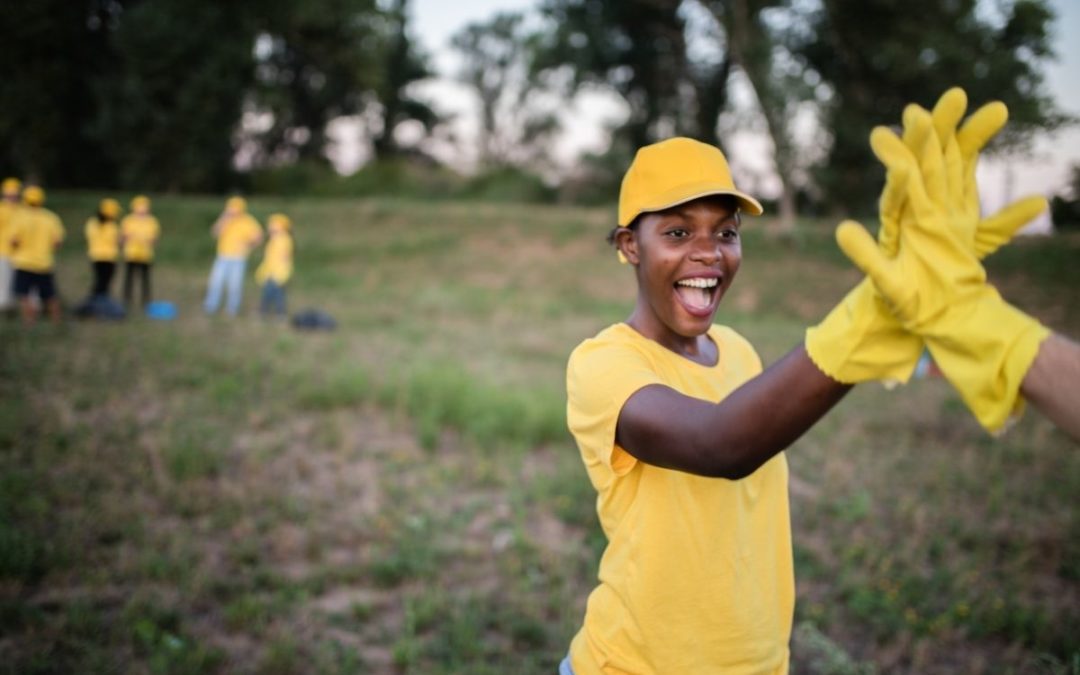Listen time: 12 minutes
Lots of people are starting to talk about the value of altruism.
Wikipedia defines altruism as the principle and moral practice of concern for the happiness of other human beings or other animals, resulting in a quality of life both material and spiritual.
I’ve found myself talking specifically about altruism and the value of circular solutions in the context of their value to one-person businesses and the wider community.
A circular solution is one that feeds itself, like composting food waste and using what you end up with to fertilise new vegetable plants. For a solution to be circular, it should solve a problem (diverting food waste from landfill) and create something new (an organic, non-chemical fertiliser). For a solution to be effective, it should be easy and obvious and give the person it’s aimed at a good enough reason to choose it.
The value of altruism
The concept of altruism can seem like a counterintuitive concept when we consider what we think we know about the selfishness of people, but when you look at it more closely, it may start to make sense.
We’re told that humans are by nature, entirely selfish but the evidence doesn’t seem to support that view. We also know that like eating ice-cream or getting a massage, behaving altruistically makes us feel good, which is great news because it’s easier to get people excited about doing things that are pleasant than things that aren’t. This is the case regardless of how necessary the thing may be, like getting a colonoscopy or preparing for your own funeral.
According to an article titled Altruism in Psychology Today, altruism seems to be part of human nature for most people. “Cooperative behaviour allowed our ancestors to survive under harsh conditions, and it still serves a purpose in a highly complex society.”
The article suggests that altruism can be either selfless or selfish. “In some sense, altruists put others’ interests ahead of their own—but giving to others often feels good and can result in longer-term gains for the giver. “Reciprocal altruism” is a term used by scientists for helping that is sustained by an eventual payoff from the person that receives help.“
It also talks about a “warm glow” effect. “Even when people don’t expect recognition or reward for a good deed, they often feel energized and happy afterward—a sensation sometimes called a “helper’s high” or “warm glow.” It likely helps to reinforce altruistic behaviour in those who feel it.”
We also know that people are likely to buy a product or service they see the value of or that feels like it was made with them in mind.
The more closely we can match the services we offer with the real, urgent needs we see in society – and market them accurately – the more likely it is they’ll be taken up, which is great news for us and even better news for society.
What circular solutions could look like
Circular solutions to problems in society could follow the same principles. For example, to start doing something about the problem of an increasing number of isolated young men entering the mental health system, we could create mentorship programs staffed by recently retired tradesmen who have experience in mentoring apprentices. There are a few examples of this around already, including Mentoring Men and Top Blokes.
Young men could spend time with a mentor in a community workshop each week, making wooden boxes to be used as garden beds for a community vegetable garden located within a community park. The retired person could be paid a nominal amount for their time by the government, the young person could learn practical, marketable skills that will add to his sense of self-worth and his resume, and the community could benefit by getting well-made wooden boxes, made from wooden pallets diverted from landfill and access to vegetable gardens where they could learn to grow their own food and connect with people with similar interests.
I’m pretty sure the cost of this would be less than extended treatment for the young person in the mental health system and I’m sure it would also have a positive effect on the mentor. Many people experience depression after retirement as they become disconnected from a sense of purpose and their sense of self-worth declines. Loneliness and poor mental health contribute to poor physical health and increased medical costs, so this kind of mentoring relationship and other similar initiatives may in fact lower costs associated with aged care.
Circular solutions for entrepreneurs
Using the example above, an entrepreneur who noticed a lot more people talking about a rising number of young people entering the mental health system could consider something like this.
Perhaps the entrepreneur is a personal trainer who works for themselves from home. Let’s say the entrepreneur has a brother who suffered from depression and has always wished they’d been able to help him more. During the pandemic, they noticed more people in their community talking about the mental health of young people. In addition to the other programs they ran, they might put together a group fitness program aimed at young men experiencing mental health issues, offering two classes a week in boxing and general fitness. The program could be timed to fit in with school hours and given a catchy title that indicated community. They might ask around for the help of a young person who fits the mould of what young people think of as “cool”, to help them make sure that their marketing wasn’t likely to repel the people it hoped to attract. They could advertise the program at the local high school and run it at a fixed price (certainty), for a fixed term (simplicity), with the option of an obligation-free try-before-you-buy session on the first day (overcome hesitations). This program wouldn’t be the basis of their entire operation, it would be an experimental program that they could afford to lose money on while they refined it.
Imagine if every entrepreneur incorporated elements of altruism into their business by noticing needs in the community and considering original ways to address them?
What to do about obstacles
Being able to come up with good ideas is one thing, but figuring out what to do when you hit brick walls is something else.
We need the mindset of a renovator rather than the mindset of a builder. As much as we’d like to, we can’t just knock down all the illogical structures in society and start again, we’ve got to pick through them to work out what’s worth keeping and what belongs on the scrap heap.
The illogical structures such as gender roles or retirement are likely to be there for a reason, even if those reasons make no sense to us today. The sheer number of these structures, mean that coming across them is a certainty and negotiating them successfully, essential.
We can’t change what is, we can only imagine what could be and use our best critical thinking skills – the analysis of facts to form a judgment – and an attitude of compromise to get us from where we are now to where we’d like to be.
Nobody’s coming to save us, but that’s okay because we’ve got what we need to save ourselves
The people who make the decisions and create the rules in our local, state and federal governments, aren’t the problem solvers of today or the innovators of tomorrow, they’re the dependable plough horses – good at staying on course and following the furrows laid in the past.
The things that are preventing us from creating intelligent solutions to the problems around us aren’t going to get out of the way until we can identify what they are and we can come up with practical alternatives.
We’ve got plenty of clever people and ingenious ideas, but we need everyone to become better at critical thinking. We need to identify circular solutions, spurred on by the ones who don’t take no for an answer and held accountable by the peacemakers and philosophers.
A father in Pakistan wants the same things for his family as a father in Paris, Sydney, Idaho, Honolulu, Seoul, Helsinki or Nairobi. Anyone who encourages people to think differently is either operating from a place of fear, ignorance, or self-interest. All those are valid feelings, but they’ve taken up too much of our past and have no place in our future.
Entrepreneurs are people who’ve given a lot of thought to making sense of the world and they’re ideally suited to help other people do the same. We need to get people like this to think, learn, collaborate and experiment because together, they stand an excellent chance of creating an exciting tomorrow for everyone, everywhere.
What you can do
If you liked this series, talk to someone else about it. If you loved it, talk to two. Like yawning, positivity is infectious so let’s see what we can do about spreading it around.
Sources
https://www.psychologytoday.com/au/basics/altruism
https://en.wikipedia.org/wiki/Altruism
https://mentoringmen.org.au/
https://www.topblokes.org.au/


